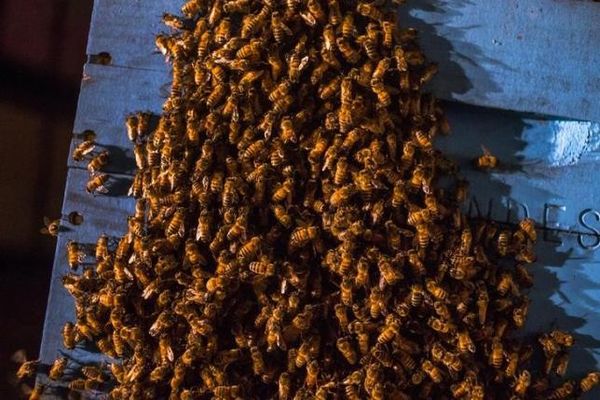U.S. EPA proposing temporary pesticide-free zones for honeybees
Date: 29-May-15
Country: USA
Author: Carey Gillam

A colony of Italian worker bees congregate outside their hive while
pollinating a blueberry field near Columbia Falls, Maine June 22,
2014.
Photo: Adrees Latif
U.S. environmental regulators on Thursday proposed a rule that would create temporary pesticide-free zones to protect commercial honeybees, which are critical to food production and have been dying off at alarming rates.
The restrictions are aimed at protecting bees from "pesticides that are acutely toxic" to them, and would cover foliar applications when certain plants are in bloom and when commercial honeybees are being used to pollinate crops, the Environmental Protection Agency said in an 18-page outline of the rule. In foliar applications, the pesticide is put on the plant.
Honeybees pollinate plants that produce roughly a quarter of the food consumed by Americans, and beekeepers travel around the country with managed hives to help the process.
The rule, due to be published in the Federal Register on Friday, would apply to pesticide applications to blooming crops where bees have been contracted to pollinate and would cover 76 active ingredients used in pesticides, including a popular class of insecticide known as neonicotinoids.
Earlier this month, the U.S. Department of Agriculture said that honeybees had disappeared at a staggering rate over the last year. Losses of managed honeybee colonies hit 42.1 percent from April 2014 through April 2015, up from 34.2 percent for 2013-2014, and the second-highest annual loss to date, according to the USDA.
Commercial beekeepers reported adverse effects from pesticide applications to roughly 20,000 bee colonies pollinating almonds and roughly 2,000 colonies contracted to pollinate blueberries in 2014, and there are claims of tens of thousands more colonies similarly affected, the EPA said.
Beekeepers, environmental groups and some scientists say neonicotinoids, or neonics - used on crops such as corn as well as on plants used in lawns and gardens - are harming the bees.
But Bayer, Syngenta and other agrichemical companies that sell neonic products say mite infestations and other factors are the cause.
The White House has formed a task force to study the issue, and the EPA said Thursday it continues to conduct "chemical-specific risk assessments for bees" and will consider additional product-specific mitigation efforts.
Critics said the plan falls short because it does nothing about neonics used in seed treatments, applied before the seed is planted. The seed treatments have long-term damaging effects on bees as the neonics persist in the environment, critics say.
"EPA needs to take the next step and ban these poisoned seeds," said Lori Ann Burd, environmental health director for the Center for Biological Diversity.
(Editing by Peter Galloway and Jonathan Oatis)
![]()
© Thomson Reuters 2015 All rights reserved